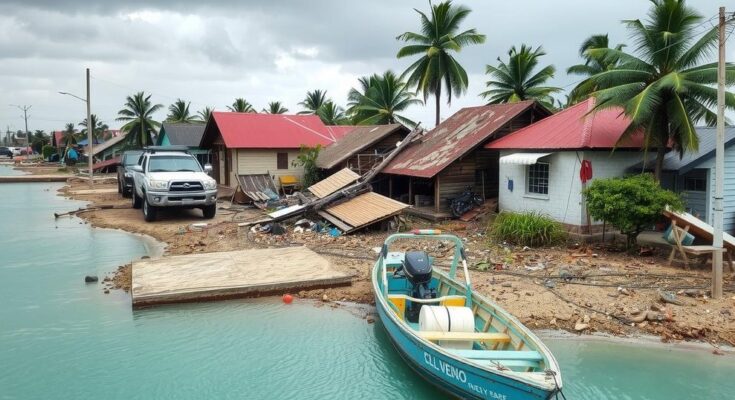Mozambique has recorded a rise in death toll from Tropical Cyclone Chido to 94 as cleanup continues. The cyclone caused extensive damage, destroying homes and impacting numerous residents. The storm also affected Mayotte, where authorities report ongoing casualties. The political unrest in Mozambique further complicates recovery efforts, as the nation grapples with fallout from recent elections amidst the humanitarian crisis.
Mozambique has updated the death toll from Tropical Cyclone Chido to 94, following the devastating passage of the storm, which wreaked havoc across the region last week. The nation’s disaster management authorities adjusted the numbers from the previously reported 76 fatalities. This catastrophic event not only left a trail of destruction in Mozambique but also severely impacted the French island territory of Mayotte, where authorities are still assessing the toll.
Cyclone Chido reached category four strength, causing massive devastation as it traveled through the Indian Ocean. It destroyed approximately 110,000 homes in Mozambique and affected around 620,000 residents, with most victims concentrated in Cabo Delgado province. Wind speeds exceeded 260 kilometers per hour, along with intense rainfall that inundated the region with 250 millimeters in a single day.
The cyclone’s arrival coincided with ongoing unrest in Mozambique, stemming from a post-election crisis marked by allegations of electoral fraud against President Daniel Chapo’s administration. This turmoil has resulted in the loss of at least 130 lives due to protests against the election results, further complicating the recovery efforts in the wake of the cyclone. As for Mayotte, a week after the cyclone struck, the interior ministry has reported 35 casualties and approximately 2,500 injuries, yet these figures may rise due to the undocumented migrant population inhabiting the affected areas.
French President Emmanuel Macron’s visit to Mayotte was marred by controversy as he made inflammatory comments in response to demonstrators. In a statement criticized by left-wing politicians, he asserted that if Mayotte were not part of France, the situation would have been significantly worse. Despite no reported deaths, the Comoros, which claims sovereignty over Mayotte, observed a national day of mourning for the victims of Cyclone Chido. After moving over Mozambique, the cyclone impacted Malawi as well, leading to at least 13 deaths and numerous injuries there, although it had diminished in intensity by that stage.
Tropical Cyclone Chido emerged as a powerful storm in the west Indian Ocean, inflicting extensive damage across several regions. The cyclone’s impact was notably severe in Mozambique, where the government has reported a significant death toll and widespread destruction, particularly in the Cabo Delgado province. The cyclone’s intensity and subsequent humanitarian crisis have been exacerbated by the ongoing political unrest in Mozambique, further complicating recovery efforts. International observers have scrutinized the political landscape in the aftermath of the election, leading to protests against the government amidst a demand for accountability and transparency. Additionally, the French island territory of Mayotte has been grappling with its own challenges, as the cyclone previously wreaked havoc on its infrastructure, and the true extent of fatalities remains unclear due to potential underreporting among undocumented migrants. This situation highlights the vulnerability of certain populations in the face of natural disasters, typically exacerbated by social and political issues.
The enhanced death toll from Tropical Cyclone Chido signifies a tragic outcome for Mozambique and its residents as recovery efforts continue. The cyclone’s effects, alongside the turbulent political climate, exacerbate the challenges faced by the government and communities struggling to rebuild. In parallel, the situation in Mayotte reflects similar vulnerabilities, with reports of casualties still being assessed. The incident sheds light on broader issues of climate change and political stability that affect disaster preparedness and response efforts in the region.
Original Source: www.abc.net.au




